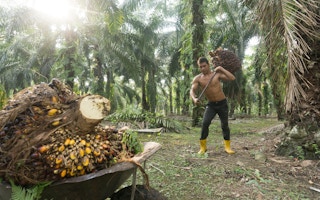Economically, palm oil could easily be considered a good investment. The industry has grown steadily over the last two decades, with demand consistently outstripping supply, to become the world’s most produced and most consumed vegetable oil. The rise and spread of palm oil is primarily due to its cultivation efficiency—four to five times higher than crops such as rapeseed oil or sunflower oil—and due to the numerous uses of palm oil and other oil palm by-products, ranging from foodstuff to cosmetics and biofuels.
To continue reading, subscribe to Eco‑Business.
There's something for everyone. We offer a range of subscription plans.
- Access our stories and receive our Insights Weekly newsletter with the free EB Member plan.
- Unlock unlimited access to our content and archive with EB Circle.
- Publish your content with EB Premium.
Like many things, however, it is not that simple; an economically sound investment is not necessarily an ethically sound investment. Since its inception, critics of palm oil have cited extreme deforestation, habitat loss, and human rights violations associated with its production. In contrast, its proponents have referred to the high returns offered by palm oil, and the resulting socioeconomic development it can bring to rural communities. To determine whether palm oil is, or can be, an ethical investment, we need to know more about both the positive and negative effects that oil palm production can have. What are the problems associated with palm oil, and is there an environmentally sustainable way to produce it? If so, can we identify sustainable palm oil and reliably avoid investment in palm oil that is unsustainable?
Many of the negative environmental impacts associated with palm oil stem from the climate that the oil palm grows in, and so the resulting areas in which it is best to build oil palm plantations. Unlike rapeseed and sunflower plantations, which tend to be in temperate climates, palm oil plantations must be grown in tropical climates most at risk from deforestation. This native climate results in oil palm plantations often replacing some of the most biodiversity-rich habitats on the planet. Demonstrating this, the ICUN (International Union for Conservation of Nature) reports that 193 Vulnerable or Endangered species are under pressure as a result of palm oil operations, the most famous example of which is the critically endangered orangutang.
Beyond habitat and biodiversity loss, the draining and burning of carbon-rich peatland rainforests for plantations releases vast amounts of carbon dioxide into the atmosphere. In 2015, 2.6 million hectares of rainforest were burned in Indonesia alone—this is 1.6 per cent of the country’s total area, and 2-3 per cent of its forest. This tripled the country’s carbon dioxide emissions and caused a public health crisis that resulted in the closure of schools and more than 500,000 cases of acute respiratory infection. Over 100,000 distinct human-made fires caused this crisis, used to clear land for agricultural practices, mostly palm oil farming.
Despite all of this, a potential investor must consider that palm oil farming is responsible for millions of people’s livelihoods. A palm oil development can bring valuable infrastructure—such as roads, schools and hospitals—to rural and deprived communities. Additionally, small-scale palm oil developments can be a useful tool in bringing people out of poverty. In Indonesia, for example, smallholder oil palm plantations account for 42 per cent of the total nationwide. However, this does not mean that the introduction of palm oil development will necessarily improve the quality of life of local inhabitants. Some research suggests that in Indonesia, the opposite is true, with villages that become a part of oil plantations exhibiting lower social and economic wellbeing than those that do not.
Moreover, extreme human rights abuses including forced labour, child labour and regular sexual abuse are often reported on palm oil plantations in Malaysia and Indonesia. High levels of state ownership in these countries—30 per cent in Malaysia—combined with corruption, can result in, at a local level, law enforcement perpetuating such human rights abuses and, at an international level, state pushback on scrutiny and intervention.
However, due to the ubiquity of palm oil, there is no way to cut it from the global supply chain without a viable alternative. Indeed, a key question is what alternatives are there that are available at scale? Half of the world’s population currently relies on palm oil within their diet, and there is no obvious alternative that would replace this. Furthermore, from some perspectives, palm oil appears to be the best option available, exhibiting the highest efficiency and taking up the lowest amount of land. According to a 2018 ICUN (International Union for the Conservation of Nature) briefing, the land used to cultivate oil palm consisted of less than 10 per cent of land grown for oil and fats globally, and yet that land produced 35 per cent of the total output.
It is clear that this is not a simple issue, and there are no straightforward answers. Palm oil cultivation often has clear and extreme negative impacts, but can these be avoided? The answer to this may, in fact, be yes. The ICUN Oil Palm Task Force believes that a strategy of avoidance, mitigation and restoration could reduce impacts to a fraction of what they would be otherwise, while remaining effects could be compensated for by following an offset program. Whilst ICUN is not an organisation that would design or help producers to implement such a strategy, they point to certification bodies that do.
Additionally, there is evidence to suggest that sustainability in the palm oil industry is possible and is already being implemented, albeit at a very small scale. A 2018 National Geographic investigation looked into the nascent palm oil industry in Gabon, and found that collaboration between corporations, NGOs, and the government was resulting in an industry that was developing with environmental and social concerns at its centre.
The palm oil industry of Gabon has the advantage of being small (<0.01 per cent that of Malaysia or Indonesia), and of learning from the mistakes made, often as a result of inadequate initial regulation, in other countries. And even this small industry, praised by some, has been criticised by others. In countries such as Indonesia and Malaysia, the task is much greater. But no matter the country, or the size of the industry, it should still be possible for development to follow the principles of sustainability. The Roundtable on Sustainable Palm Oil is a body that seeks to lead sustainable environmental governance within the palm oil sector by awarding certification to producers of sustainable palm oil. The receipt of certification is contingent on the passing of on-site inspections and annual surveillance audits, and the use of the RSPO certified palm oil is additionally audited throughout the supply chain. While various bodies implement such standards, the RSPO is the most widely used.
Such certification schemes, and the RSPO in general, are not without their critics. A 2018 study investigated RSPO-certified plantations in Borneo and found no evidence of improvement on any of the environmental or social metrics considered, with the only positive difference found being a small increase in crop yield. Additionally, some large companies such as Felda, a state-owned Malaysian producer, one of the largest palm oil companies in the world, and a member of the RSPO, still to this day appear in news reports detailing multiple cases of human rights abuse.
Since the publication of the 2018 study, the RSPO has released a more stringent set of Principles and Criteria that are required for certification, together with a call for research on critical topics, acknowledging their shortcomings and attempting to fill necessary gaps in research on palm oil. These moves have been met positively, with the World Wide Fund for Nature (WWF) endorsing the latest changes, referring to RSPO certification as an ‘essential tool’ in achieving sustainable palm oil. The general feeling seems to be that, while not yet perfect, the RSPO at least is a vehicle that can help promote a more sustainable approach to palm oil production.
Investors may wish to exclude palm oil from their portfolios for a range of environmental and social issues, and recent developments with certification schemes may not go far enough for many people. However, considering the rising demand for vegetable oils globally, the lack of viable alternatives, and the possibility of being able to produce palm oil in a genuinely sustainable way, investors may wish to view the inclusion of certified palm oil in a different manner. The difference between certified and non-certified palm oil, though uncertain, will become an even more important consideration in future, as demand increases, certification schemes improve – for instance, through blockchain technology - and attempts to restrict palm oil production solely to low conservation-value areas become widespread. As land-use pressures grow, non-certified palm oil production may push further into high-density forests and peatlands - amongst the most biodiverse and carbon-rich habitats in the world - causing the contrast between sustainable and unsustainable palm oil to become clear.
Dr. Roan du Feu is a Research Associate at global asset management firm Arabesque Asset Management.











